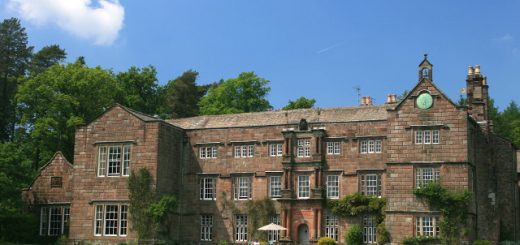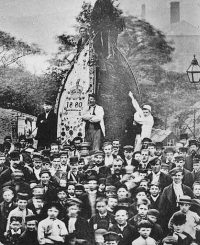Investigation Equipment
I realise that the case itself and the onsite experiments you wish to do should dictate the equipment you take on an investigation. However, I have come across groups who bring along all the gadgets they have and think the more high tech a piece of equipment is, the more scientific it makes them appear.
I realise that the case itself and the onsite experiments you wish to do should dictate the equipment you take on an investigation. However, I have come across groups who bring along all the gadgets they have and think the more high tech a piece of equipment is, the more scientific it makes them appear.
So, my question is, what equipment do you use and why? Also, what items don’t you use no matter what and again why?
For instance, I’d include a camera, usually a digital model. This is primarily to record the location visually, such as room layouts etc. I don’t try to chase orbs and I don’t expect to catch a ghost in a photograph, though if the opportunity arises and I see an appartion walking along I will endeavour to take it’s picture.
Oui Ja boards I wouldn’t use, regardless of what they are made of or model as it smacks of pseudoscience.
So, what do you use? Thermal Imaging Equipment, Infra Red Camera’s, Night Vision Scopes, Video Cameras, EMF Meters, Interdimensional Portals?




my brain???
my brain???
Good Answer
[quote=Ophiel]
my brain???
[/quote]
I like that Ophiel :). It makes you wonder though how useful the equipment usually seen on vigils/invesigations actually is.
Ophiel, the Brain. Is that
Ophiel, the Brain. Is that for something you use or something you don’t? lol
Video and still cameras are
Video and still cameras are obviously vital. Video cameras are needed so that if anything happens, the events surrounding it can be examined. Still cameras are required because they have much better resolution that video cameras.
Any environmental monitoring equipment can be useful. For instance, damper, cooler places attract more ghost reports because they ‘feel spooky’. It is useful to compare haunted areas of buildings with similar non-haunted ones to look for such differences.
The biggest problem with equipment is that people using it often don’t understand how to use it properly, what it is measuring, what constitutes normal readings and so on. It isn’t the equipment that is a problem but those who operate it wrongly.
Is there any equipment that
Is there any equipment that you would consider to be useless, or perhaps not as valuable as useful as some groups make them out to be? For instance, Night Vision Scopes, are they a waste of money?
People shouldn’t be doing
People shouldn’t be doing investigations in total darkness – how are they supposed to see anything (such as a ghost!), so I can’t see any point to night vision equipment. The images aren’t very good anyway, particularly for long distance. Why not just leave the lights on? It’s not like ghosts only appear in the dark and there are virtually no reports of them glowing!
Its useful to be able to see..
I will second the above regarding working in darkness. Some say that cutting power is beneficial for EMF readings, but I am personally suspicious of this. Some of the best phenomena I ever saw occurred in daylight and in the presence of regular lighting at night.
It’s also important to remember that in many reports, percipients are in lit environments.
So working in darkness is a mystery to me after studying this field for 40 years.
I do believe the EMF may (or may not) be useful in locating potential electrical disturbances for example, although the jury is out on the actual causal connection the EMF field may have to environmental experience. Done correctly though (think MADS) it is potentially useful and no harm to do as a baseline. Audio/video recording is useful again to capture the environment (who was where doing what and when) and audio recordings are likely most interesting as a way to potentially capture discarnate voices, something which does occur and can be heard easily with reasonably high qualith microphones and low-noise audio recording equipment. Orbs, not interested, mostly the same for EVPs, just not reliable enough – too ambiguous. I would try to avoid anything which requires high amounts of interpretation or is highly subjective in nature.
The TriField Natural EM
The TriField Natural EM Meter does not score high on it’s ability to spot ghosts here.
I believe Night Vision
I believe Night Vision Goggles are a critical pice of equipment in any investigation carried out in far from optimal light conditions. Thermal Night Vision is probably overkill as are Fusion Imaging Systems (mostly because they are very, very pricey) but I make no escuse in going out in the field with cheap NVG. Getter buy an older (Gen 1, 2+ , HPT) system from a reputable manufacturer like ATN than one of those cheap but fancy "never -heard-this-brand-before" goggle.
I also have a question: what about cameras? Better digital or film?
In Distortion We Trust
If you need night vision
If you need night vision equipment, you are at a light level where misperception is going to be a big problem. I wouldn’t take results from such low light investigations too seriously from a scientific point of view.
Digital cameras are superior in almost every way to film cameras (the one obvious downside being less latitude but that is being addressed as the technology progresses). The major advantages include:
* the ability to check photos instantly is crucial, particularly when detecting photographic artefacts;
* the ability to change light sensitivity, resolution and colour balance on the camera instantly (in the bad old days this required changes of filter, lens and film!)
* EXIF data is hugely helpful in analysing photos (it’s amazing how many people don’t notice the flash going off or the shutter staying open a long time)
* better resolution than 35mm (over about 6 megapixels)
* more accurate colour rendition
* the ability to make copies without loss of data – easily
* no need for delays and possible image changes by going through the developing and printing process
* lower cost per photo
And so on.
Thanks for the reply. To be
Thanks for the reply. To be honest I was still clinging to the completely obsolete idea of analyzing film looking for defects and/or manipulation, a lenghty, costly and sometimes frustrating procedure.
As far as NV goes I’ll be honest: I’ve never "chased ghosts" so I cannot say anything but I’ve been into cryptozoology and they are pretty handy even when ordinary animals are involved. A mysterious "big cat" will look suspiciously similar to a big tomcat with the right tools.
In Distortion We Trust